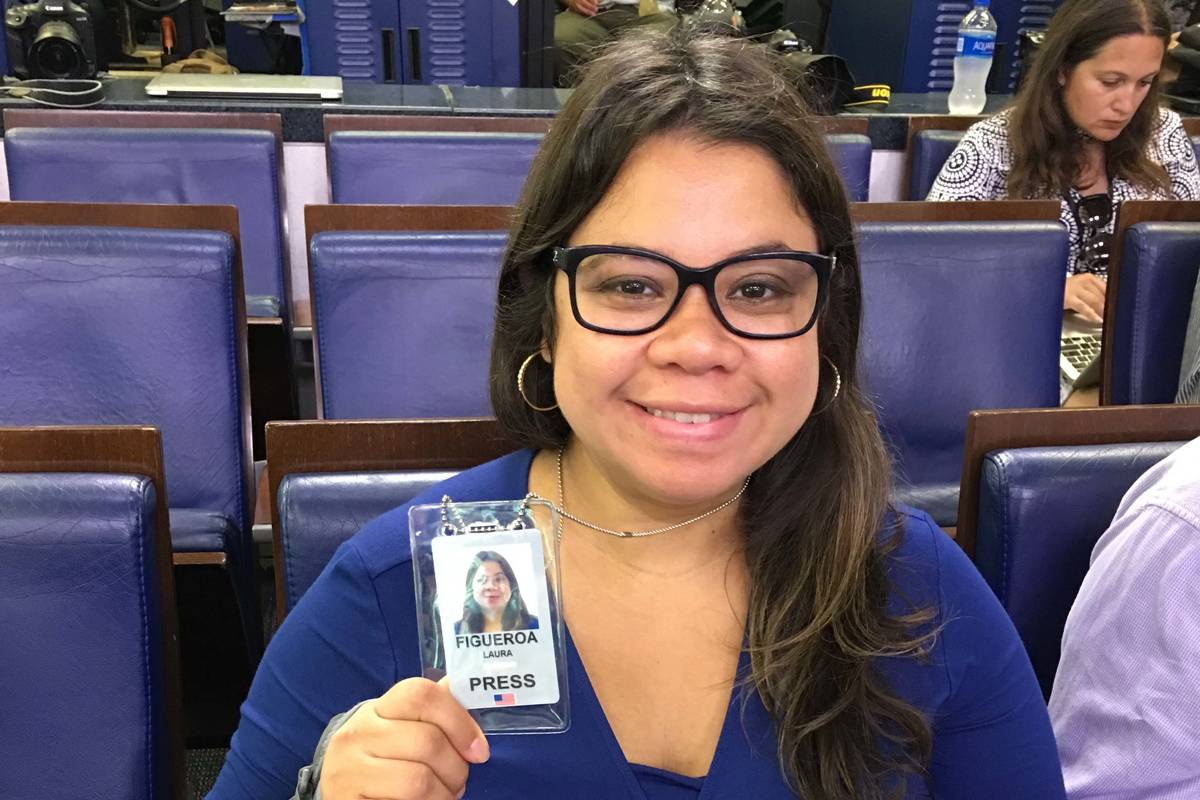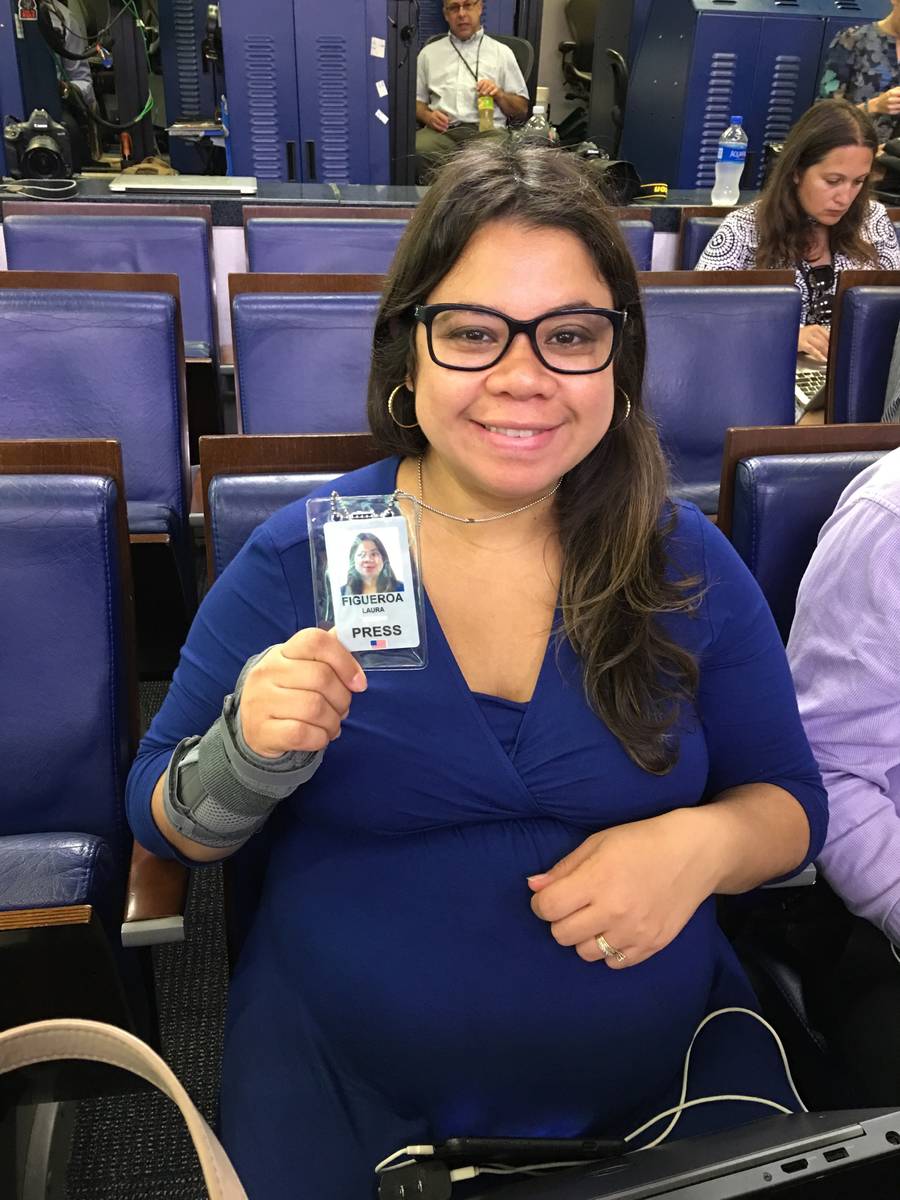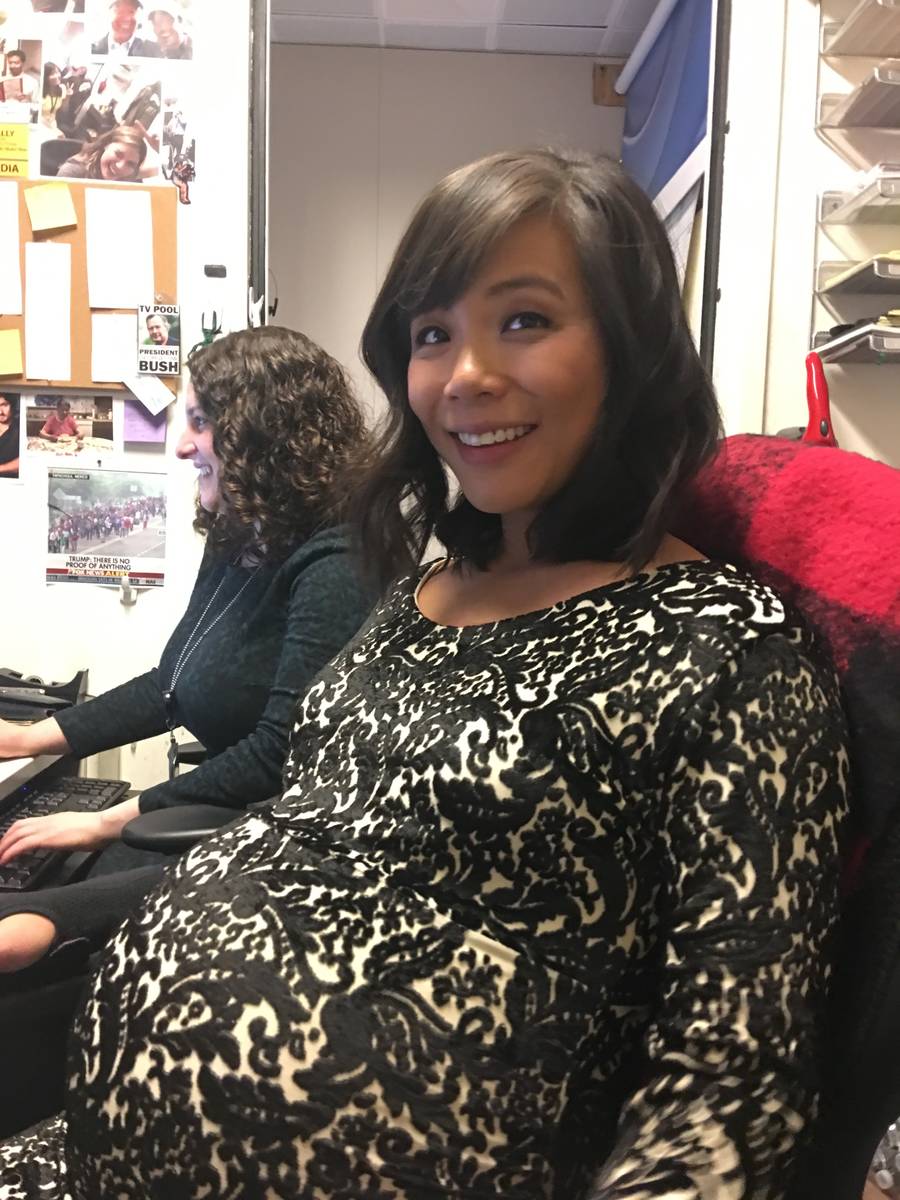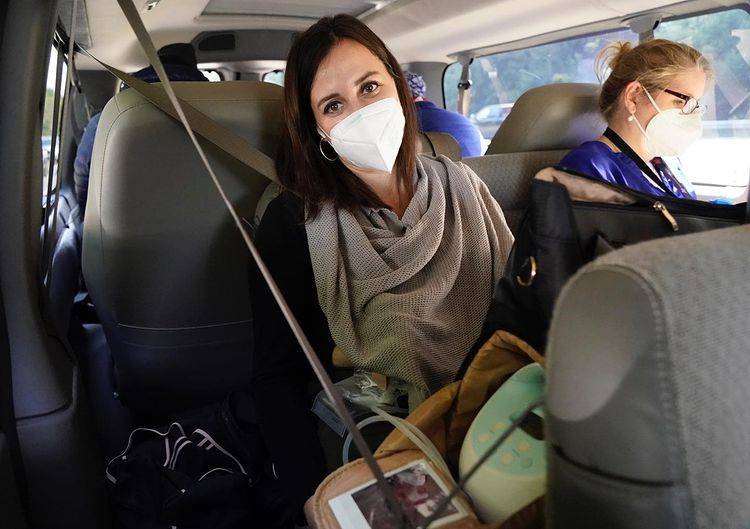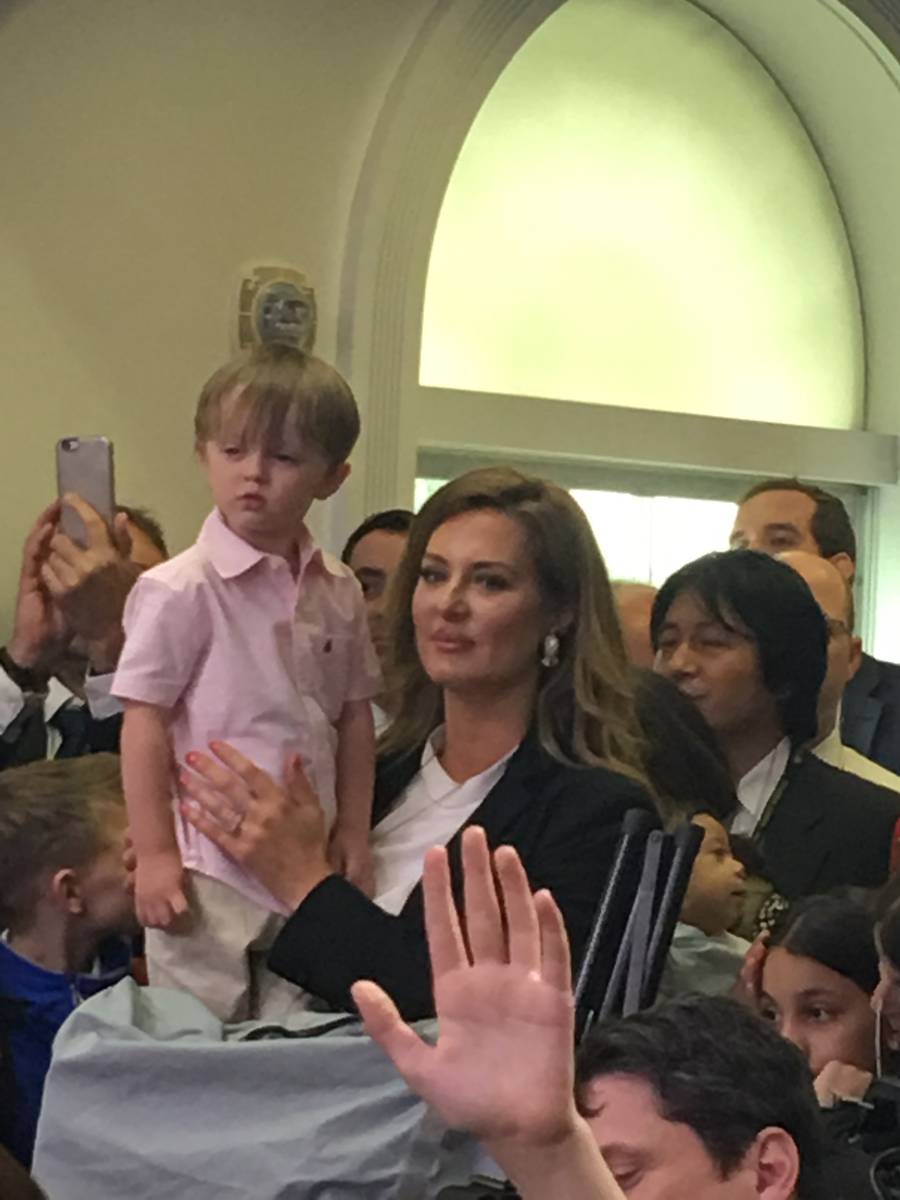‘Trump bumps:’ Women covering the White House can have it all
WASHINGTON — When Newsmax White House correspondent Emerald Robinson was pregnant with her second child, she fell in love with the name Arabella, which means “given to prayer.”
There was one little problem. She didn’t realize that President Donald Trump’s oldest grandchild shares the same name until a colleague told her.
“I thought I was being original,” Robinson told the Review-Journal. She thought there might be blowback if her husband and she gave their daughter the same name as the firstborn child of Ivanka Trump and husband Jared Kushner, both of whom serve as unpaid White House advisers.
But it’s a beautiful and meaningful name, she said, so she did it anyway. And there was no blowback.
That’s life when you are among the many female reporters who work the White House briefing room while expecting. Given the high ratio of pregnant reporters covering the White House, wags call it the other “Trump bump.”
CBS News White House correspondent Weijia Jiang’s pregnancy was revealed to friends, family and the world when she stood up to ask Trump a question after the United Nations General Assembly in New York in 2018. As she asked the president about allegations he had sexually harassed women, Trump famously told the visibly pregnant Jiang to “sit down.”
Jiang told the Review-Journal she often has thought about the “Trump bump” and the high percentage of women who were expecting, and she believes that “it’s really a reflection of women deciding they want to try to have it all at the same time.”
“I can’t answer why so many correspondents have had babies under this administration, but I think it’s just because we’re making more progress as a gender,” she continued.
When Jiang started out in news, she was told that women could have it all but not at the same time. But all around her, she now sees women who have decided “yes, we can have it all at the same time.”
“I think more people are adopting that mentality,” she said.
Crowded briefings
During Trump’s freshman year, daily press briefings were jammed affairs, with all 49 seats in the briefing room filled. Reporters and photographers clogged the aisles as they jockeyed for a choice spot to lob questions. The crowded events, for which members of the media began lining up far ahead of the scheduled start, were especially grueling for expectant mothers.
Former Fox 5 reporter Ronica Cleary recalls “standing for an hour and waiting for a White House briefing to start when no one will give the pregnant lady a seat.”
Will it be easier covering President-elect Joe Biden? NPR’s Tamara Keith, who was out on maternity leave in 2018, doesn’t expect big changes for expecting and new moms as they cover the next administration, but she expects fewer late night tweets, which could make reporting life a little less stressful.
“It’s much more likely that we’ll get a lid before our children go to bed,” said Keith.
A “lid” in Washington parlance means the end of presidential news on a given day. That means mothers will have “a better chance of making bedtime.”
To the outside world, working mostly from home might look like a boost in family time, but Keith said that for her, the hardest part of the past few months was how many times she missed dinner.
With day care closed, she added, “it’s a lot harder having little kids now.”
Newsday’s Laura Figueroa agreed.
“I know some journalists appreciate being able to work from home,” she said. “I’m thankful to have a job where I can do that. At the same time, I have a 2-year-old.”
That’s not optimal when you are interviewing sources over the phone.
Logistical challenges
One advantage to working at home: breast pumping presents less of a challenge.
Keith has pumped on Air Force One, which few can say. Still, she was in awe as she talked about MSNBC’s Hallie Jackson, a new mom, who pumped from a full pool van during a motorcade ride from Walter Reed National Medical Center, where the president was hospitalized, to the White House.
And Jackson took a selfie, which she posted on Instagram.
“It’s just a picture, but to me it’s a snapshot in time, on day 3 of nonstop coverage, on about 6 hours of sleep total, during one of the most intense weeks of my professional life” Jackson wrote on Instagram. “Not a day went by this week where I didn’t miss at least one pumping session. All the things you’re supposed to do to keep up your milk supply went out the window: regular removal, hydration, plenty of rest (lololololol) But you know what? It’s okay.”
Looking back on the challenges of covering Trump while starting a family, Jiang recalled the logistics of traveling internationally while pumping.
In India, Japan and South Korea, Jiang pumped when she could and kept her milk in hotel freezers. She had to find Styrofoam and dry ice locally, so at the end of a trip, she would pack the frozen milk and check it on her flight with her luggage so she could return home with milk for her daughter Frankie Mei.
The White House press area carved out a basement-level breast pumping room in a news pod that doubles as office space for CBN, the Christian Broadcasting Network. A news pod is about the size of a van, so when a nursing mom needs the room, the CBN staffer leaves.
During the coronavirus, the White House Correspondents Association has urged members not to work in the White House press area unless they are poolers, who file dispatches for other news organizations, or have claim to one of 14 of 49 briefing room seats that can still be used under social distancing guidelines. Only authorized photographers can stand in the aisles by those seats.
Crowds gone, anxiety remains
The coronavirus has eliminated the crowding that caused friction for all members of the press corps, but extra anxiety for expecting journalists.
“Just when I thought I had the most memorable experience of being pregnant while working as a White House correspondent, I trumped that and had my next pregnancy during a global pandemic,” Cleary said as she recalled giving birth to her third child, which entailed “getting a COVID test between contractions and delivering a baby while wearing a mask.”
“When my newborn arrived in July of 2020, I whispered to him, ‘No matter what is going on around us, nothing can come between us.’” Cleary added.
COVID-19 presented other elements to soon-to-be mothers.
“Because the news was so crazy and so busy, I almost forgot that I was pregnant,” said Robinson.
The Newsmax White House correspondent expects Trump’s departure to be followed by a drop-off in White House press corps pregnancies.
“So here’s the thing about the ‘Trump bump.’ Trump was a boon for the media, right?” she said, repeating a view prevalent among journalists.
Robinson wonders whether without Trump, career journalists will feel less secure “about stepping away to have kids because you always feel you’re at a risk.”
Trump is the only president Figueroa has covered from inside the White House.
“To me, this has been the norm,” Figueroa said. She wonders whether the Biden White House will play by different rules that give the press corps fewer opportunities to ask the president questions.
“It was nonstop. It’s COVID. It’s the election. It’s the economy. It was just relentless this year,” she added. The whirlwind gave her an appreciation for Press Secretary Kayleigh McEnany, Trump’s fourth top spokesperson, who took the podium five months after giving birth to her first child.
Looking back at all those Trump bumps, Jiang mused, “There could very well be just as many ‘Biden bumps.’ We don’t have the rhyme, but the alliteration is just as good.”
For her part, Keith expects another crop of correspondents association babies next year. “I do think there’s going to be another baby boom. There is after every election.”
Contact Debra J. Saunders at dsaunders@reviewjournal.com or 202-662-7391. Follow @DebraJSaunders on Twitter.
The briefing room's new mothers
Pamela Brown, CNN
Ronica Cleary, Fox5
Laura Figueroa, Newsday
Kristin Fischer, Fox News
Hallie Jackson, MSNBC
Weijia Jiang, CBS News
Tamara Keith, NPR
Ashley Parker, Washington Post
Ayesha Rascoe, NPR
Emerald Robinson, Newsmax
Marissa Schultz, New York Post
Jessica Stone, CGTN
Anne Walters, dpa



